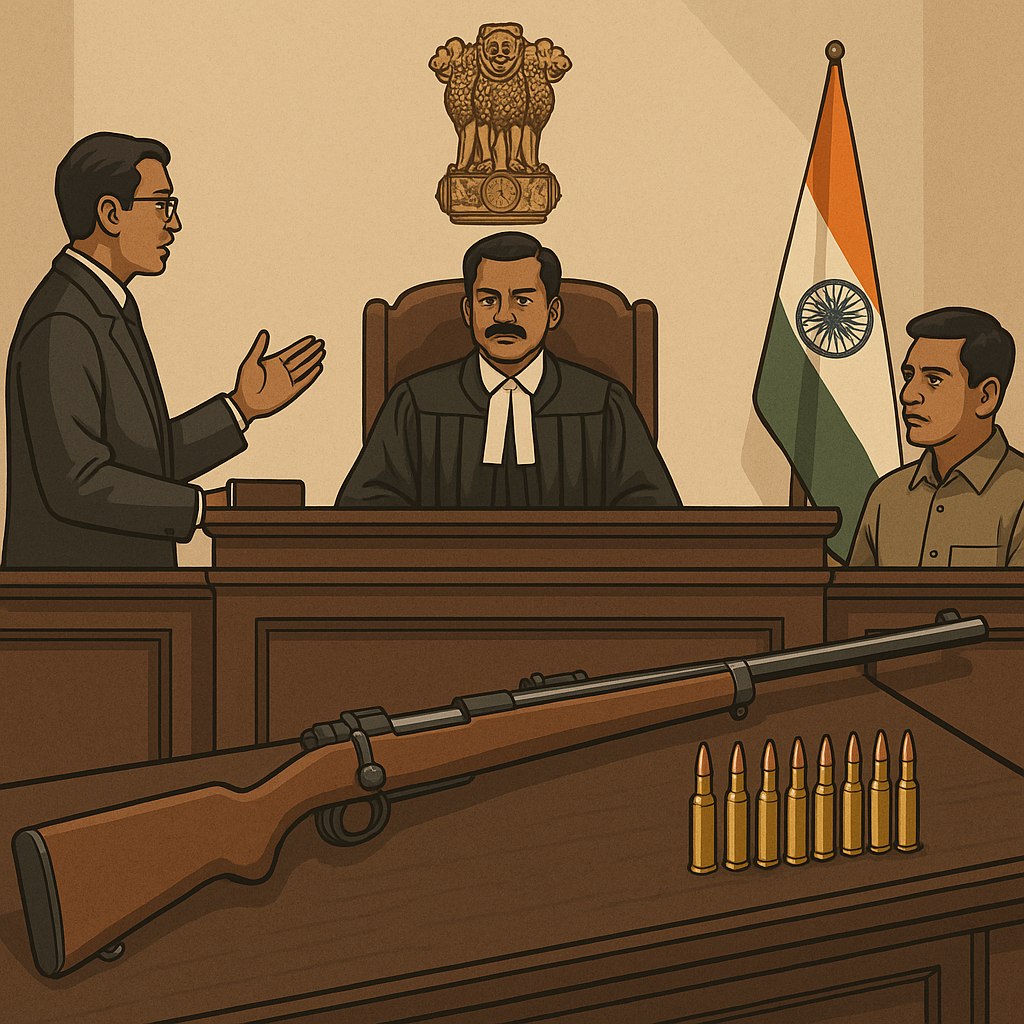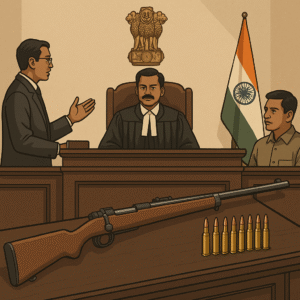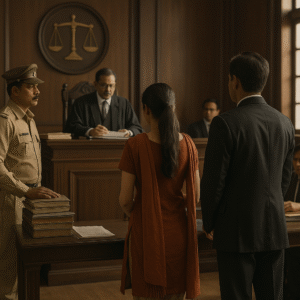The Patna High Court has set aside orders of the Chief Judicial Magistrate (CJM) and the Sessions Judge that had refused to release a licensed firearm seized from a vehicle in a 2018 Kotwali P.S. case in Patna. Deciding a petition under Section 482 CrPC (criminal miscellaneous jurisdiction), the Court quashed the orders dated 07.11.2020 (CJM) and 08.04.2021 (Sessions Judge) and permitted release of the arm and cartridges to the petitioner, subject to stringent conditions including a two-lakh-rupee bond and verification of the licence and ammunition conformity. The judgment is significant for clarifying that mere pendency of a criminal case or a pending proposal for licence cancellation, without final cancellation, is not by itself a reason to deny interim custody under Section 451 CrPC when the weapon is admittedly licensed and unconfiscated.
Simplified Explanation of the Judgment
This case reaches back to an incident on 11 March 2018, when the police, during vehicle checking near Patna, chased and stopped a white Fortuner. Upon search, five persons were found inside, and a rifle with 10 live cartridges was recovered from one occupant (the present petitioner). The FIR alleged that the group was engaged in land dealings using hired gunmen to create fear, and none produced the original licence on demand at the spot. These allegations formed Kotwali P.S. Case No. 148 of 2018.
After seizure, the petitioner approached the CJM, Patna, for release of the firearm under Section 451 CrPC (interim custody of property). The CJM rejected this on 07.11.2020; a revision before the Sessions Judge also failed on 08.04.2021. The petitioner then moved the High Court seeking quashing of both orders, arguing that the arm was duly licensed, the petitioner had clean antecedents, the weapon had not been confiscated, and the licence had not been cancelled.
The High Court recorded the core issue succinctly: If a person with clean antecedents holds a valid arms licence, can the arm be denied release merely because he was found in the company of co-accused and because a letter has been sent to the licensing authority proposing cancellation—when, in fact, the licence has not yet been cancelled?
On the facts placed before it, the Court noted that (i) the counter-affidavit of the Senior Superintendent of Police, Patna, did not dispute the existence of a valid licence or the petitioner’s clean antecedents; (ii) the licence had not been cancelled till date; and (iii) the arm and cartridges had not been confiscated. The petitioner also undertook to produce the weapon in trial whenever required.
To support interim release, the petitioner relied on the Supreme Court’s decision in Sunderbhai Ambalal Desai v. State of Gujarat, (2002) 10 SCC 283, which encourages expeditious exercise of powers under Section 451 CrPC to avoid unnecessary deterioration of seized property and to reduce the burden on police/courts of maintaining custody. The judgment reproduces the well-known paragraph summarising why timely release, with proper panchnama and safeguards, serves justice.
Finding the State unable to rebut these submissions on the materials available, the High Court quashed the Sessions and CJM orders, and directed release of the firearm and cartridges, but with careful conditions to protect the trial and ensure lawful possession. These include (a) a personal bond of ₹2,00,000 with one solvent surety, (b) production of the licence before release and verification that the seized cartridges are within the licence terms (withholding cartridges if they are not), and (c) a continuing obligation to produce the weapon and cartridges before the competent court whenever required, at the petitioner’s expense. The trial court may impose any additional conditions.
In essence, the judgment balances two interests: safeguarding criminal proceedings and preventing deterioration or unnecessary retention of lawfully-licensed property. The Court’s approach underscores that mere allegations in the FIR and a pending administrative proposal to cancel a licence cannot, without more, override the statutory framework of Section 451 CrPC when the weapon is licensed and not confiscated, and when the holder undertakes to produce it as required.
Significance or Implication of the Judgment (For general public or government)
For the public, this ruling clarifies that an arms licence holder is not automatically deprived of interim custody of the licensed arm simply because of an FIR or because the police have sent a proposal to cancel the licence. Unless the licence is actually cancelled or the weapon is confiscated by due process, Section 451 CrPC remains available for interim release, subject to safeguards. This prevents unnecessary deterioration of valuable property, saves storage costs, and enables courts to rely on documented panchnamas and photographs rather than storing physical items for years.
For the administration, the decision is a reminder to apply Section 451 CrPC pragmatically. Police and trial courts should verify the licence particulars and ensure the ammunition complies with licence conditions. If doubts persist, release can be tailored (as here) by withholding non-compliant cartridges, insisting on bonds, and requiring production as and when needed. The ruling also reduces Malkhana burdens and aligns practices with the Supreme Court’s guidance in Sunderbhai, which emphasises swift, judicious orders to avoid wastage and misappropriation of seized property.
Legal Issue(s) Decided and the Court’s Decision with reasoning
- Whether interim release under Section 451 CrPC of a licensed firearm can be denied solely because (a) the holder was with co-accused at the time of seizure and (b) the police have proposed licence cancellation (without actual cancellation).
Decision: No. Absent cancellation or confiscation, denial is unjustified when the licence is valid and the holder has clean antecedents; conditions can sufficiently safeguard the trial. - What safeguards should accompany release of a licensed arm pending trial?
Decision: Furnish a personal bond of ₹2,00,000 with one solvent surety; produce the original licence; verify cartridge conformity with the licence; if cartridges are beyond licence terms, withhold them; ensure production of the arm and cartridges whenever directed; the trial court may add conditions. - Whether prior lower court refusals were sustainable.
Decision: No. The CJM’s order dated 07.11.2020 and the Sessions Judge’s order dated 08.04.2021 were quashed as they failed to appreciate the admitted facts (valid licence, clean antecedents, no cancellation/confiscation) and controlling principles under Section 451 CrPC.
Judgments Referred by Parties
- Sunderbhai Ambalal Desai v. State of Gujarat, (2002) 10 SCC 283 — relied on by the petitioner to justify expeditious release of seized property under Section 451 CrPC and to avoid deterioration of arms kept in Malkhana.
Judgments Relied Upon or Cited by Court
- Sunderbhai Ambalal Desai v. State of Gujarat, (2002) 10 SCC 283 — principles quoted on the need for prompt, judicious exercise of Section 451 CrPC, proper documentation, and minimising chances of tampering.
Case Title
Dinesh Kumar v. State of Bihar
Case Number
Criminal Miscellaneous No. 64946 of 2021; arising out of Kotwali P.S. Case No. 148 of 2018 (G.R. No. 1623/2018)
Citation(s)
2025 (1) PLJR 893
Coram and Names of Judges
Hon’ble Mr. Justice Chandra Shekhar Jha (Oral Judgment dated 06.02.2025)
Names of Advocates and who they appeared for
Mr. Rudrank Shivam Singh — for the petitioner
Mr. Satyendra Prasad, APP — for the State
Link to Judgment
NiM2NDk0NiMyMDIxIzEjTg==-uC4er4zdM90=
If you found this explanation helpful and wish to stay informed about how legal developments may affect your rights in Bihar, you may consider following Samvida Law Associates for more updates.








